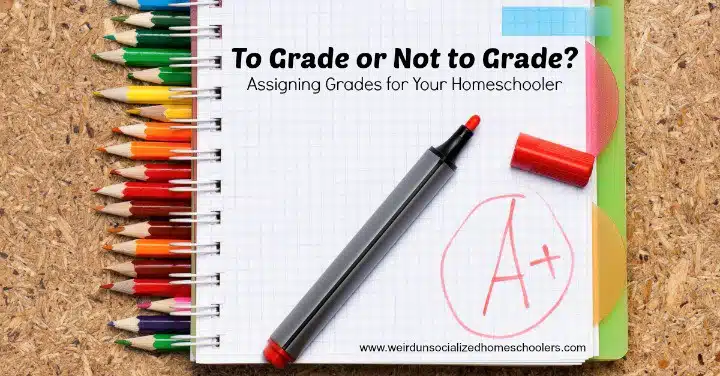To Grade or Not to Grade? Assigning Grades to Your Homeschooler
To grade or not to grade? That is often the question in homeschooling circles. Do homeschool grades matter? What should you grade? And what types of grades should you give?

Why You Might Want to Grade Your Homeschooler’s Work
The majority of homeschooling families to whom I’ve talked work to mastery. That means they don’t move on until their child has mastered the skill, topic, or concept. The thought is that working to mastery will ultimately result in all A’s, so why bother to grade?
For the most part, I agree that grades aren’t necessary for homeschooled kids. However, there are some valid reasons why you might choose to grade your student’s work.
The number one reason I hear most parents state for giving their homeschoolers grades is for high school transcripts. You may not need grades for college applications, but many homeschooling parents feel more comfortable having them listed on the transcript.
If you homeschool under an umbrella school, you may have to submit grades to meet the school’s requirements. You may also have to provide them to comply with your state’s homeschooling laws.
Grades can prove helpful for teen drivers. Many insurance companies offer good student discounts, but they require a copy of your student’s grades to get the discount.
Finally, you may have a child who is motivated by grades, especially if they’ve previously attended public school. When I started homeschooling my oldest, we did grades, stickers, happy faces made by turning the zeros of 100% into eyes, report cards – the whole nine yards. She was very motivated by grades and felt like her work didn’t serve a purpose without them.
That thought process didn’t last long – just the first couple of years – but I was happy to give her grades since she enjoyed it. Plus, Chuck E. Cheese gave out free tokens for good report cards. {grin}
What Kind of Homeschool Grades Should You Give?
As I said, many parents like to work to mastery. Some give full credit for corrected problems. Our math program, Teaching Textbooks, offers students two chances on most types of questions and awards full credit if the problem is worked correctly the second time.
On work I grade myself, I sometimes give full credit for corrections. Other times, I give full credit for work done correctly and half-credit for corrected work to determine a percentage grade. It depends on the assignment and how well the kids should know the material. In some cases, half credit seems a more fair assessment of their work, so they know where they need to study more.
I used to do half credit on Easy Grammar and Daily Grams, for example. So if there were 20 problems (for lack of a better word) on a page and they got 5 wrong, they’d get 5 points for the problems they did correctly the first time and 2.5 for the ones they had to go back and correct. That would give them a grade of 87.5%, which I’d round up to 88%.
I translate percentage grades to letter grades for transcripts and figuring GPA. There are many different scales you can use. I make life easy for myself and use the ten-point scale (90-100% = A, 80-89% = B, and so on).
You could do pass/fail, but that seems to defeat the purpose of homeschooling. Another option is satisfactory/unsatisfactory/needs improvement. This method provides a simple but effective way to offer kids feedback on their written work.
You can also give grades on the level of work your student is doing and the perceived level of effort. For example, if your student is working on something that is at or above his proficiency level and he has put forth his best effort, he receives an A.
If his work indicates a decent amount of effort, but you know it’s not his best work, he receives a B. If the effort seems poor but it’s not so bad that you insist he re-do the assignment, he gets a C. Anything less, he does over.
You may also want to consider AP classes and weighted grades for your high school student.

What Should You Grade?
Don’t grade only quizzes and tests. Include grades for daily work and projects. Not only are there test phobic kids who completely stress out over exams, but this kind of grading doesn’t provide an accurate, well-balanced picture of your student’s work.
Rubrics can make a fantastic grading tool. A grading rubric can help parents grade objectively and let students know the expectations for the assignment. Rubrics are great for tasks such science labs, writing assignments, and hands-on projects because they make it easy to focus on the most critical aspects of assignments that don’t have clear right and wrong answers.
There’s nothing wrong with choosing not to give your homeschooled students grades. However, there are reasons you might want or need to assign grades, and there’s no need to make it a stressful or overwhelming process.
Do you give grades in your homeschool? If so, what tips would you add?
Kris Bales is a newly-retired homeschool mom and the quirky, Christ-following, painfully honest founder (and former owner) of Weird, Unsocialized Homeschoolers. She has a pretty serious addiction to sweet tea and Words with Friends. Kris and her husband of over 30 years are parents to three amazing homeschool grads. They share their home with three dogs, two cats, a ball python, a bearded dragon, and seven birds.


